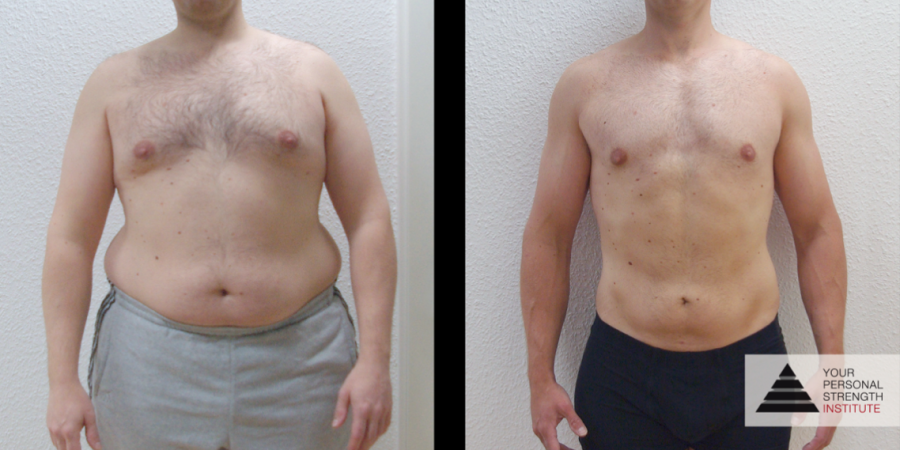"Simple, but not easy" Dean Lister
This quote is regularly used by Dean Lister when giving grappling and BJJ training sessions and seminars to explain a concept or technique. It's one of the best quotes I've heard in the past year because it hits a lot of nails on the head.
I met Dean last September at UFC Fight Night in Hamburg, where he stood in Peter Sobotta's corner. Dean himself is a former UFC fighter, Brazilian Jiu Jitsu World Champion and 3-time ADCC Submission Grappling World Champion. He teaches all over the world and likes to use this quote in connection with learning certain techniques and it means that although a technique is simple, it is not easy to execute.
Just like learning the techniques of Brazilian Jiu Jitsu - BJJ for short - progress in strength training is "simple, but not easy". Many trainers struggle to build muscle and strength, as well as lose body fat. Because it's simple, but not easy.
First of all, while strength training is an important factor in building muscle and strength and losing body fat, it is not the only important factor. Overall, 3 factors are crucial to achieve constant and sustainable progress.
1. Progressive Training
Progressive means "advancing, developing". If you were bench-pressing 80kg for 8 reps a year ago and you're still bench-pressing 80kg at the same tempo for 10 reps, your strength and muscle performance have not improved. One can even go so far as to say that the training was a waste of time in this case. Many trainees carry out the same programs for too long, so that the initial adaptation to the new stimulus quickly comes to a standstill. The more ambitious are now increasing the weights, which is a good approach and provides a progression at times. After a while, however, it's no longer possible to stay in the same rep range and still increase the weights. Otherwise you could do 4 sets of 8-10 reps all year long and keep adding weight. That never works.
Progression is based on variation.
Sets, reps, exercises, tempo, rest periods, sequencing…all are things that require variation to allow for long-term weight progression.
Progression is the basis for training success. There are several paths to progression in strength training. The one who decides at the end is more discs on the rod. If you benched 80kg for 8 reps a year ago and are now bench-pressing 120kg at the same tempo for 8 reps, your strength has evolved along with your musculature. Guaranteed. "Simple, but not easy" or in German also "simple, but not easy"
Weight progression is the cornerstone of building muscle mass and even strength - the foundation of a house, if you will. But without concrete there is no house, no matter how good the plan is. Which leads directly to point 2...
2. Eat more - and most importantly, eat more protein
The main factor in building muscle mass is eating a lot. This is where many coaches fail. Exercising without eating enough will not build muscle. If you want to pack on more muscle, you have to eat more. Simple, but not easy. Eat more. And eat more protein in general. A high and above all regular protein intake of approx. 4g protein/kg body weight per day is crucial for men to build up maximum muscle mass and strength. Protein as the first and most important macronutrient is not only indispensable for muscle building and repair, but also for detoxification - medically correct term: hepatic biotransformation - and for the immune system. A well-functioning immune system, in turn, is the basis for rapid muscle growth. Our body has its priorities and with these the immune system takes precedence over muscle building. When amino acids are limited, they are used for more essential things than building new muscle mass. It has often been claimed that excess protein damages healthy kidneys, but has never been proven. In fact, if you have kidney disease, high protein consumption is not recommended. However, it is also a fact that if you have kidney disease, in addition to protein consumption, intensive training and goals such as building muscle mass and maximum strength are certainly not recommended/possible. The adult body isn't designed to gain metabolism-boosting mass, but to maintain the status quo. Therefore, the stimulus of the training and the (over)supply of protein and food must be used to encourage him to build more muscles. Eating a lot is simple, but not easy. And when in doubt: eat more.
3. Optimize regeneration
Aside from progressive training and the right diet, there is a third pillar to consider when building muscle mass - regeneration. Recovery includes lifestyle, supplements and sleep. The lifestyle category includes stress and stress management, travel, consumption of alcohol, cigarettes or other drugs. Dealing with other people also plays a not insignificant role. If you train with stronger training partners who eat a lot and who push you to improve your own performance more and more, you will grow faster than someone who is always stronger than your training partner.
Supplements complement exercise, nutrition and sleep and cannot replace any of the three, but they can make a difference. As a basis, micronutrient supplements such as a good multi- and magnesium preparation and vitamin D/K should be mentioned here.
The sleep quantity and the right environment for good sleep quality is everyone's responsibility.
Conclusion: Only when all three of the above points are met will you expect and achieve optimal and possibly maximum muscle growth. If you only consider one or two of the three points, the result will not be optimal.
Building muscle is regular progressive training, regular high protein/food consumption, and optimizing recovery.
Simple, but not easy.
Image: Tobias lost over 40kg of body fat in 16 months. How? Through progressive training, food, sleep and consistency. Simple, but not easy.

